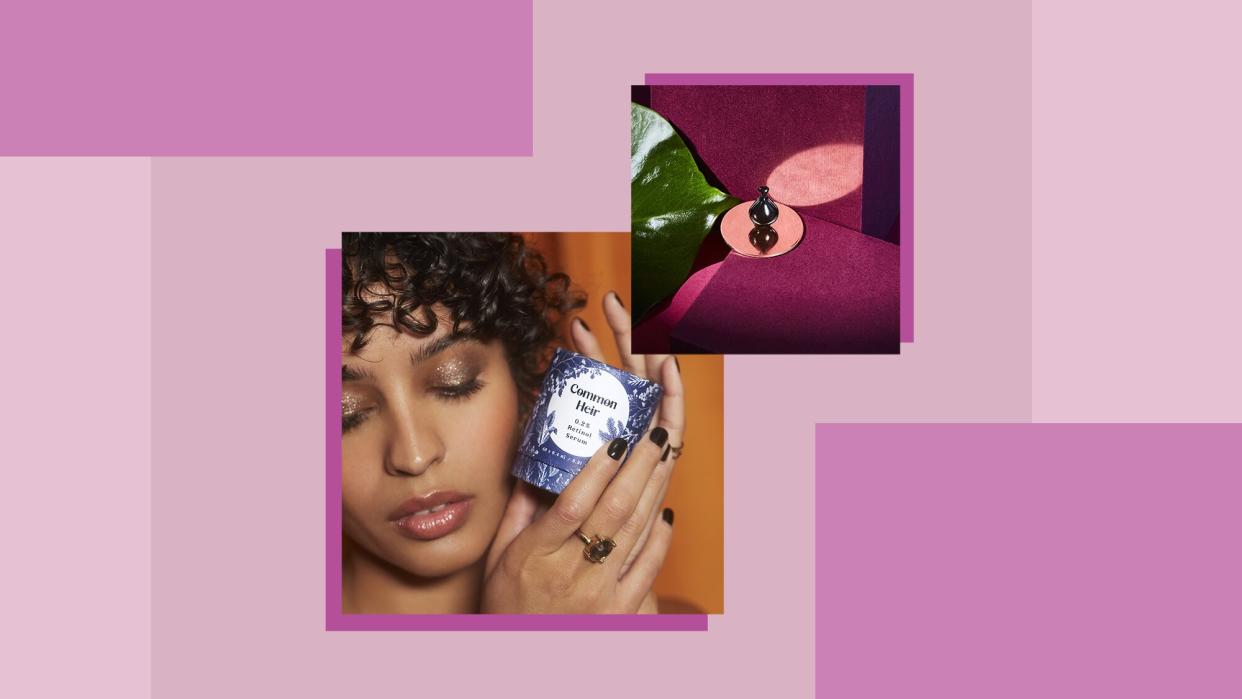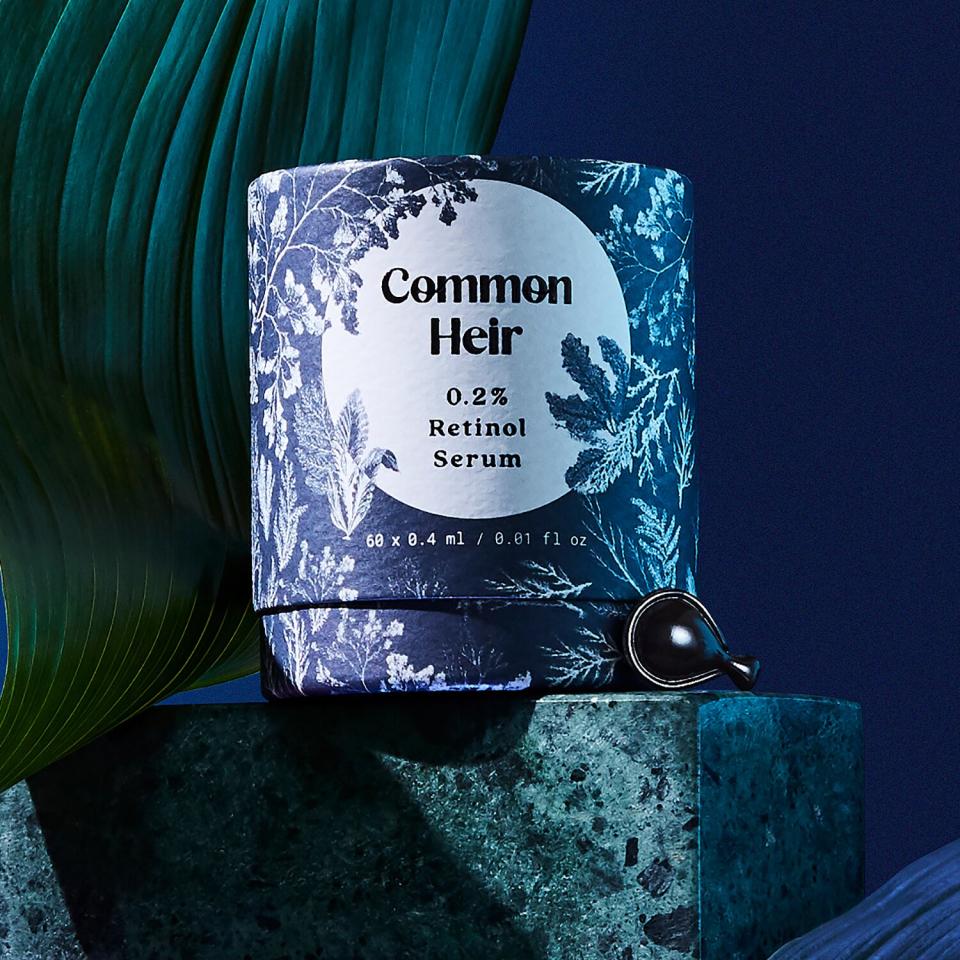Common Heir Launched a Retinol Serum Made with Melanated Skin In Mind

Common Heir
Of all the highly acclaimed skin-care ingredients out there, retinol is often considered a standout — and for good reason. The vitamin A-derivative helps to boost collagen production, speed up cell turnover, and minimize post-inflammatory hyperpigmentation — a condition that most frequently affects folks with darker skin tones, according to an article published in the Journal of Clinical and Aesthetic Dermatology.
But in people of color, retinol's potential to cause irritation can worsen — not resolve — one of the skin concerns it's supposed to treat. "With skin of color, irritation can trigger dark marks, known as hyperpigmentation," Sonia Badreshia-Bansal, M.D., F.A.A.D., a board-certified dermatologist, told the American Academy of Dermatology Association (AAD).
That's the issue that Common Heir 0.2% Retinol Serum (Buy It, $88, commonheir.com) attempts to tackle. Many of the concerns of using a retinoid on melanin-rich skin — hyperpigmentation, excessive drying, flaking, lightening of the skin, etc. — often stem from a too-high concentration or a too-harsh derivative, Angela Ubias, Common Heir's co-founder and chief product officer, tells Shape. To minimize those risks, "we carefully selected the gentlest retinoid derivative — an ester (retinyl linoleate) suspended in plant-based squalane, [which is] known to be tolerated by most skin types, and used an effective concentration, making it safe for melanin-rich skin," she explains. More specifically, retinyl linoleate is a compound formed from retinol and linoleic acid. Your body has to convert retinyl linoleate into retinoic acid through a three step-process before the ingredient can start taking effect. (The more steps your body must take to convert a given retinoid to retinoic acid, the gentler the retinoid is.)
The formula also contains the botanicals paracress extract and astragalus membranaceus root extract, both of which are rich in antioxidants that neutralize damaging free radicals to slow down skin aging. Plus, the retinol serum boasts nourishing ingredients, including algae, squalane, and safflower oils, that help seal in moisture and support the skin barrier, counteracting the drying effects of retinol. Simply put, the formula tackles the notorious, intimidating side effects of retinol head-on thanks to three key features: "A gentle retinoid derivative, an approachable concentration, and a gorgeous formula that is as nourishing as it is effective," in Ubias' words. (Related: Common Heir Created the Plastic-Free Vitamin C Capsules of Your Dreams)

Common Heir
Buy It: Common Heir 0.2% Retinol Serum, $88, commonheir.com
To ensure the Common Heir retinol serum can actually walk the walk, Ubias and co-founder and CEO Cary Lin conducted clinical trials with an independent lab to study the product's efficacy. "[It] was inclusive and representative of all skin tones, types, and ages, which we are incredibly proud of," says Ubias. "We wanted the trial cohort to look like everyone in our lives — family, friends, and the community that has supported our brand from the start." The results: After just six weeks of use, the majority of study participants said their skin felt "firmer, nourished, and replenished" and noticed an improvement in dark spots, skin clarity, and wrinkles. (Related: The Best Retinol Products for Every Skin Type, According to Top Derms)
The Common Heir retinol serum is packaged in perfectly portioned, single-use capsules made of biodegradable seaweed. Single-use retinol capsules prevent the retinol from being exposed to light and oxygen, conditions that have been shown to degrade the ingredient. While brands typically use plastic capsules (which, BTW, will never decompose), Common Heir's alternative reduces the amount of plastic that ends up sitting in a landfill. (P.S. Common Heir's vitamin C serum [Buy It, $88, commonheir.com] is also packed in this plastic-free format.)
Even with the innovative format, the capsules are incredibly easy to use: Simply twist the tip off of a capsule, squeeze the serum onto your fingertips, and apply it to your face and neck after cleansing and toning. To further reduce the odds of experiencing side effects, try incorporating Common Heir's retinol serum into your skin-care routine slowly, applying two nights a week to start and working up to every other day, according to the brand's recommendations. Applying moisturizer after each use of retinol — regardless of the brand — can also help prevent dryness and, in turn, skin irritation, Dr. Badreshia-Bansal told the AAD. (In case you need a refresher, this is the exact order to apply your skin-care products.)
Once you've squeezed out all of the product, toss the capsules in your compost bin. Or, stash them in a glass jar and, once you've accumulated a few weeks' worth, you can melt them in boiling water for 15 to 20 minutes, then pour the liquid down the sink drain, according to the brand's website.
Though Common Heir's retinol serum was designed specifically with melanin-rich and sensitive skin in mind, it was tested on a range of skin types and colors and was shown to be non-irritating, according to the brand's website. Translation: Regardless of your skin type, concern, or color, this gentle-yet-effective formula can help you be well on your way toward achieving a glowing, wrinkle- and spot-free complexion — no flaking required.

